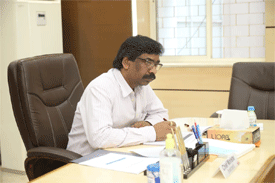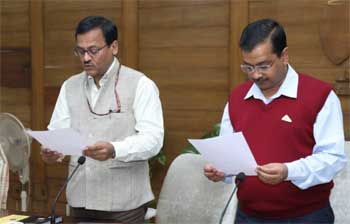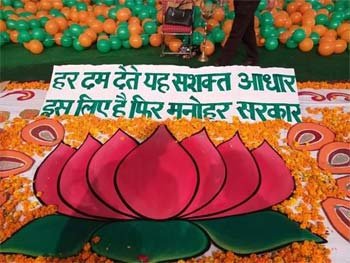Gandhinagar,
BJP’s prime ministerial candidate for the 2014 general elections, Narendra Modi, on Wednesday, rejected the view that he had remained silent on the February 2002 communal riots in Gujarat, which according to official figures, claimed the lives of 790 Muslims and 254 Hindus; caused injuries to about 2,500 people and reported 223 as missing.
“I was not silent, I answered every top journalist in the country from 2002-2007, but noticed there was no exercise to understand truth,” Modi told Smita Prakash, editor (News) Asian News International, in an exclusive interview.
He further said that he believed that unknown entities gave rise to a number of conspiracies that allegedly linked him to the tragedy.
“I have said what I had to say. Now, I am in the people’s court, and I am waiting to hear from them, and their verdict,” Modi said when prodded further on his role in the 2002 riots.
He maintained that he was committed to democracy, and added that “if the media had not worked to malign Modi, then who would known about Modi today?”
Responding to a question on AAP leader Arvind Kejriwal’s comment that editors of newspapers would flee if he became the next Prime Minister, Modi replied: “For 14 years, we (the BJP) has run the government in Gujarat. I ask you, has any editor left or, has any reporter left?”
It maybe recalled that in 2012, Modi was cleared of complicity in the 2002 violence by a Special Investigation Team appointed by the Supreme Court of India, and in April this year, the Supreme Court expressed satisfaction over the SIT’s investigations in nine cases related to the violence, and rejected as “baseless” a plea contesting the SIT report.
Narendra Modi also predicted that the ruling Congress Party and the United Progressive Alliance (UPA) government at the Centre would experience and suffer the worst performance in its history, while the opposing National Democratic Alliance (NDA) would come up with its best till date.
Modi, when asked a question on whether the NDA would achieve the coveted majority mark of 272 seats required to form a government at the Centre, said: “This will be the worst performance in the Congress Party’s history, and the BJP and the NDA’s best performance.”
Modi, who was speaking ahead of his visits to Ratlam in Madhya Pradesh and Salem in Tamil Nadu to address election rallies, said the incumbent administration’s performance over the last decade was there for all to see and judge, and all he had been doing during his campaign across the country, was to speak about these drawbacks, and highlight them, where required, and to ask the people whether they wanted a better and assured future for themselves, which the BJP and the NDA has been promising to do.
The BJP prime ministerial candidate also appeared to reject the view that Muslims were fearful of him should he come to power at the Centre, and therefore, there could be a polarisation of votes in key constituencies of the country, such as in Varanasi, from where he was contesting the polls.
He told ANI: “I am not going there (Varanasi) to defeat anyone, but to win hearts. Once I meet them all, they will love me.”
Modi and senior leaders of the BJP have thus far dismissed the impact of any anti-Modi polarisation among Muslims, who account for about 18 per cent votes in rural Varanasi, and close to 30 per cent in urban areas.
However, some local BJP leaders are reportedly apprehensive about a possible polarisation of votes because of Modi’s presence.
It maybe recalled that in 2009, there was reportedly a huge polarisation against then Bahujan Samajwadi Party (BSP) leader Muktar Ansari in Varanasi, and this allowed senior BJP leader Murli Manohar Joshi to win the seat by a small margin.
On his and the BJP’s reported differences with Tamil Nadu chief minister and AIADMK chief J Jayalalithaa, Modi said that neither Jayalalithaa nor he had made “bitter statements against each other”, and added that he did not believe there are “untouchables” in politics.
“We (AIADMK and BJP) might have different ideologies, but at a personal level, I have excellent relations with JJayalalithaaji,” Modi said further.
The reply was given in the context of Jayalalithaa recently urging voters in Karur to ensure that neither the BJP nor the Congress retained their deposits from any of the seats in the state of Tamil Nadu, targeting both on the Cauvery Waters issue.
Jayalalithaa, however, literally watered down some of the larger criticisms against the BJP like on the Ram Temple and the Uniform Civil Code.
The BJP prime ministerial candidate also said that it neither right for him or for Congress vice president Rahul Gandhi to politicise the issue of crime against women, and the steps that needed to be taken to ensure their safety.
When asked specifically about the 2009 “Snoopgate” case in which Gujarat government is said to have intercepted telephonic conversations of a lady, Modi said: “Crimes against women is national shame. We should all work as a nation. Rahul (Gandhi) shouldn’t politicize it and nor should I.”
On the issue of criminalisation in politics, the Gujarat chief minister said that he was all in favour of setting up special courts under the aegis of the Supreme Court to try politicians accused of crime.
“As far as MPs of all parties who have cases against them, I will request the Supreme Court to set up special courts,” Modi said.
He further said that he would like to see all such cases to be taken up and tried in these special courts within a year, and ensure that the guilty are sent to jail, their seats vacated,and see a non-criminal occupying it.
He said that it will be my aim to “try for consensus to create these special courts to try criminal politicians.”
“Nobody really disagrees, but I want to do it, and I am open to suggestions. This step is not being considered out of vindictiveness, or with the aim of slapping cases on (our) opponents. It is aimed at cleaning the system,” he said.
He also rubbished allegations of forking out huge sums of money during his election camapign to promote and project him as the ideal candidate for occupying the office of prime minister after Dr. Manmohan Singh, jocularly remarking: “If you ask the Congress, they would have said 15,000 crores, and then 20,000 crores.Whatever number they dream up they say.”
“The Congress has 25 days left in government. I urge them to investigate this. Duudh ka duudh, paani ka paani kardo (Automatically, it will become clear as milk separates from water).”
“I say let the Election Commission scrutinise expenditure in each constituency, and if the Congress has any evidence, they should send it to the Election Commission,” he added.
















